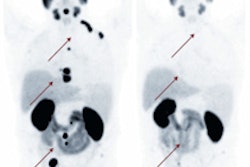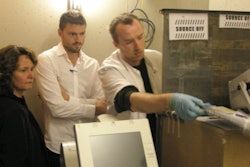A new scintigraphy molecular imaging scan can pinpoint the dangerous buildup of amyloid proteins in the heart and predict major adverse cardiac events, according to a study presented this week at the Society of Nuclear Medicine and Molecular Imaging (SNMMI) conference in Baltimore.
The condition, known as transthyretin (TTR) amyloidosis, is named after the gene thought to cause the buildup of the nonsoluble amyloid proteins. Over time it can lead to hypertension, an enlarged heart, an abnormal heartbeat, chronic heart failure, a heart attack, or even death.
The study team from Henri Mondor Hospital in Créteil, France, is using a myocardial scintigraphy imaging technique that involves the injection of technetium-99m hydroxymethylene diphosphonate (Tc-99m HMDP). Known for bone imaging, recent studies have suggested it may be useful for detecting amyloidosis, hence this first study to prove its prognostic value in cardiac amyloidosis.
Based on the results of the study, anyone with suspected cardiac amyloidosis should undergo the scan, lead author Dr. Axel Van Der Gucht said in a statement.



















